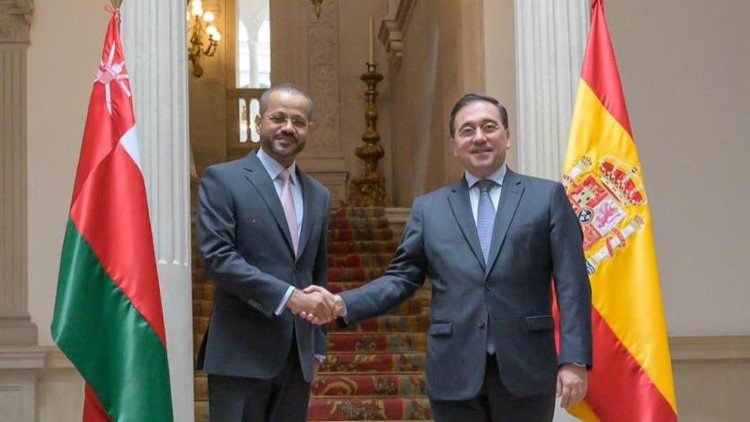The Diplomat
The 7th European and Latin American Editors’ Congress completed its second day in Madrid yesterday before setting off for Brussels, where the next two sessions, Wednesday and Thursday, will be held under the slogan “The quality of information and the credibility of the media, guarantees for democracy”.
New technologies applied to journalism, disinformation and the defence of democracy through the media are the central themes of this Congress, which is bringing together for the second time fifty editors from the main media in Europe and Latin America, with a combined audience of around 460 million people.
Day two
The second day was divided into six sessions on Tuesday. Four of them at the Senate headquarters in Madrid and another two at the Aranjuez campus of the Rey Juan Carlos University.

After the Vice-President of the Senate, Javier Maroto, welcomed the congress participants, the first of the panels – ‘Diversity and inclusion in the media‘ – began with the participation of the Deputy Director General of CODESPA, Elena Martínez, who explained the work of this organisation to integrate disabled people and people at risk of poverty into the workplace, and the WRadio correspondent in Madrid, Alba Lucía Reyes.
In the second panel – ‘Geostrategy, disinformation and fake news in wars’ – the director of Res Pública-Civic Resilience Center, Giedrius Sakalauskas; the director of the European Observatory for the Analysis and Prevention of Disinformation, Asela Pintado; and the professor of Constitutional Law at the Complutense University, Rafael Rubio, analysed current disinformation tactics and how to counteract them in defence of democracy.
‘Where are Latin America and Europe turning politically?’ was the title under which the President of the Euroamerica Foundation, Ramón Jaúregui, and its Secretary General, Adrián Bonilla, unravelled the most recent political changes in Europe and Latin America to give a vision of the nearest institutional future in both continents.
The fourth and final panel in the Spanish Senate focused on ‘Citizen participation in the media’. Magdalena Trillo, professor at the University of Granada; Liza Gross, senior advisor at the Solutions Journalism Network (SNJ); and Luis Ayllón, director of The Diplomat in Spain, debated how to encourage reader participation in order to win back those who have abandoned the traditional media.
In Aranjuez – after attending a lunch and a presentation of the most advanced technologies at the Telefónica headquarters in Madrid – the ‘Current state of the drug trafficking business’ was the title under which the Spanish ambassador, Nicolás Pascual de la parte; the director of the research portal Código Vidrio, Arturo Torres; and the director of the Committee to Protect Journalists, Carlos Martínez de la Serna; with the co-director of the Congress, Carlos Mora, as moderator, gave their speeches.
The long working day ended with an analysis of the ‘Influence of politics on the impartiality and independence of the media’, by Fernando Chamorro, founder and editor of Confidencial:; Nathan Jaccard, member of the Organized Crime and Corruption Reporting Project (OCCRP); and Stanislau Ivashkevich, president of the Belarusian Investigative Center.
Day One
On the first day of the Congress, the first panel addressed the topic of ‘Ethics and journalistic responsibility’. Speakers included Jaime Abello, director and co-founder of the Gabo Foundation in Colombia; María Luisa Humanes, Professor of Journalism at the Rey Juan Carlos University, and Alfonso Sánchez-Tabernero, Professor of the Faculty of Communication at the University of Navarra.
The second panel dealt with the topic of ‘Technology and the media’, with interventions by Javier Ramos, rector of the Universidad Rey Juan Carlos; Diego López Garrido, executive vice-president of the Fundación Alternativas, and Miguel Angel García, director of Escudo Digital.
The Congress was inaugurated at Casa América last Monday, before the two aforementioned panels, by Susana Sumelzo, Secretary of State for Ibero-America, the Caribbean and Spanish in the World, who highlighted the need for more good journalism to help society confront phenomena such as intentional disinformation, which generates destabilising effects on democracies.
“We need a pluralistic media because societies are pluralistic,” said Sumelzo, while warning of the challenges posed by the presence of technologies such as Artificial Intelligence. For this, she said, regularisation is required.
Europe has already made progress in this area with the enactment of the Law on Freedom of the Media and the Law on Artificial Intelligence, both of which must be complied with in all EU countries.
As Yago González, CEO of Prestomedia, the company organising the Congress, pointed out, these regulations hope to inspire regions such as Latin America to generate initiatives that help to face the circumstances of the polarised and highly technological world in which we live.
Regarding the Media Freedom Law, González pointed out that, just as it protects the free exercise of journalism, prohibiting outside interference, it also calls for transparency of the media in the eyes of the public, demanding, for example, clarity about who owns them. But he also called for the institutional framework created around the law to be prevented from becoming a space for censorship of the press.
Alberto Barciela, co-director of the Media Congress, asked members of Congress not to forget that the eyes of journalists should be on those who suffer, in reference to the wars that plague the world. And, as has been traditional since the beginning of the EditoRed congresses, Barciela read a letter addressed to an icon of communication and literature in Europe and America. On this occasion, the letter was addressed to Julio Cortázar.

The Editors’ Congress
The 7th Congress of Media Editors of the European Union, Latin America and the Caribbean is an event organised by the Prestomedia Group with the support of EditoRed, the European Commission and Parliament, Telefónica, Iberia and the Community of Madrid, as well as the collaboration of the Rey Juan Carlos University, Turismo de Galicia and Casa América, and with Prensamedia as editorial partner.







